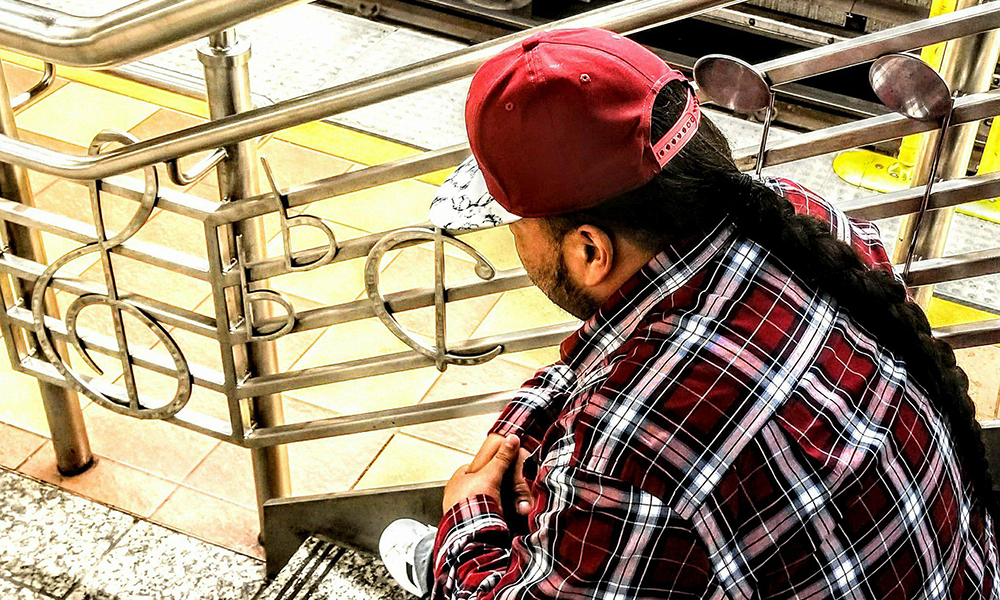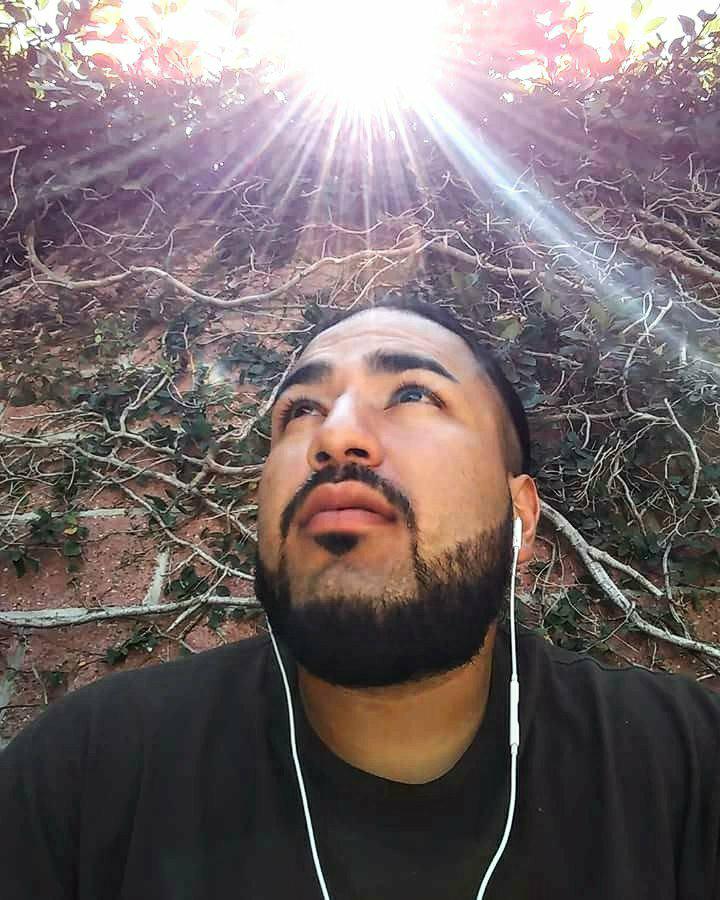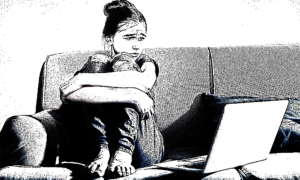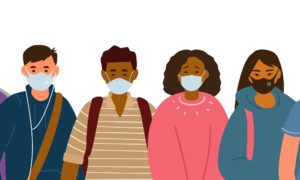
As kids we were told not to touch the stove or we’d get burned. A warning was enough for some, but others had to feel the sensation of the hot flames burning the skin to understand. Then there were those whose mesmerization by the flame drove them to touch it repeatedly, even if it caused them pain.
I was more of the latter. Although I knew the flame would burn, I touched it repeatedly. It wasn’t always like this. I was the youngest of three brothers in a family overseen by a single mother.
Growing up in South Central Los Angeles, a young woman pushing a stroller down the sidewalk with a baby crying in it while another child skipped along ide wasn’t a strange sight. Whether she was on her way to or from school or on a simple walk to the store, you hardly ever saw a male father figure beside them.
As a kid, I didn’t really focus on the absence of my father but rather on the presence of my mother. She spent the majority of her time working to provide for herself and her three kids, but even when she was away, she was a powerful figure whose presence was still felt at home.
She left Guatemala at a young age to lead a better life for her and my oldest brother, who she carried in her stomach at the time. They arrived to pursue a life of happiness out here in California. I wonder if she began to feel captive to her Guatemala environment, the way I eventually began to feel about mine in Los Angeles.
City as kennel
 When I became a teenager, the neighborhood I once felt freedom in began to feel limited. It became the liquor store to the north, where the O.G.s hung out in front with brown paper bags in their hands, while the youngsters waited around the corner for theirs. To the south it was the burger joint, where long days and nights living fast led you to get your meal. To the west there was the bakery, where all the mothers purchased fresh, warm bread for their households on Sunday mornings. To the east was the 10 freeway, which acted like a bridge, dividing two worlds that were actually more similar than one thought. I was enclosed in these parameters, parameters that existed only to those who lived in South Central L.A.
When I became a teenager, the neighborhood I once felt freedom in began to feel limited. It became the liquor store to the north, where the O.G.s hung out in front with brown paper bags in their hands, while the youngsters waited around the corner for theirs. To the south it was the burger joint, where long days and nights living fast led you to get your meal. To the west there was the bakery, where all the mothers purchased fresh, warm bread for their households on Sunday mornings. To the east was the 10 freeway, which acted like a bridge, dividing two worlds that were actually more similar than one thought. I was enclosed in these parameters, parameters that existed only to those who lived in South Central L.A.
Suddenly, my city, which I once viewed as the place for tourists, the home of stars and celebrities, began to feel like a small kennel. There was violence and crime where I lived, yet somehow it still felt safer than the rest of the city that I didn’t know. So many tragedies would take place in my neighborhood, yet none seemed to make the news — as if we were on an island by ourselves. It led to this stigma that we were on our own in South Central.
As more time passed in my teenage years, it wasn’t only my city I felt disconnected from, but also my family. The absence of my father gave me a sense that I had to grow into a man quickly and on my own. And my brothers, the two older role models, began to feel like two older comparisons of the life I should and shouldn’t live.
My oldest brother was a knucklehead in his youth, which meant I had to carry the consequences of his actions in my own attempts at freedom.
“You want to quit school and hang out in the streets all day up to no good like your brother?” my mom would say sternly.
“Entonces, escúchame.” Listen to me.
When that didn’t shake me out of it, I had to live up to my second brother’s standards.
“Why can’t you get good grades and take school and your future more seriously … como tu otro hermano?”
Believing my own lies
Although a part of me recognized that my mom was just trying to push me to be better in those regaños — or scoldings — it was hard to listen. With my mother constantly working hard, she couldn’t possibly see all the pain I was dealing with. She was there to scold me but not to comfort me when I felt I needed her the most. She was able to notice my grades dropping and my attitude changing, but she couldn’t see how I was hurting, or the reasons why I began acting out. Feeling as if no one would understand or cared about my problems, I let my imagination harbor a better world for me.
I began to believe my own lies. The streets carried these stigmas I felt I had to adopt. Between my friends and me, there was a stigma about school, that it was more of a daycare center than a place of learning, or a distraction that stood in the way of what we really wanted at the time — the things Los Angeles seemed to love most: expensive clothes, jewelry, fast cars and everything else easy money could buy.
There was also the stigma that we who lived in South Central weren’t good enough for the lavish life, as if it was assumed that we didn’t deserve it, which only led us to believe that we had to make it happen on our own terms. With no job at the time and a family I felt disconnected from, I chose to leave school and started to hang out with some older cats who had that fast life I felt I needed.
Now the lavish life
I began to make the lavish life my own, materials and all included. Suddenly, everyone began to notice my new encounters, including those I didn’t even want in my business. But the more people knew about me on the streets, the more I began to care less. The truth is, I needed to escape the noise that surrounded my environment, a place away from the distractions that stood before me.
Although I was aware that I’d grown up being taught right from wrong in my household, it didn’t change the fact that it still took a toll on me when everything seemed to fall apart between my family and me. I had to find that connection somewhere else, and so I felt I would gain love, trust and a better understanding of myself with those older cats, because somehow they could relate to my story. Things went on with the lavish life for awhile, until I realized I had to stop myself.
It wasn’t until I was given an opportunity to give myself the time, space and attention to grow that I realized I was going about living my life all wrong. Somehow, life had its way of sitting me down. Finally, advice from those who surrounded me couldn’t have come at a better time. I held questions about life that I didn’t hold the answers to, but suddenly it seemed as if those who surrounded me not only understood me, but held those very answers I was searching for.
Looking within
One day I sat down with an O.G. who I could finally relate to. He grew up carrying the same stigmas I did: feeling less than worthy, his voice unheard and, like me, a hopeless teen without a future based on his environment, too. He admitted to chasing the easy money in his youth, believing he was doing it out of necessity, like I was. Then he told me how he felt he had failed himself when he realized he spent so much time focusing on everything around him instead of everything within him.
“Within,” he said, “de adentro.”
I had done the same. I didn’t realize what I had because I was too fixated on what others had. My necessities were always there, but a sense of greed drove me to seek more. I was confused and mad at the world. When I got my hands on what I thought I could call my own money, instead of making me feel more complete, the money just made me more mad and confused. I wanted to know how to reach a better state of mind, one like the O.G.’s. He told me my happiness was my own and that no one could simply give it to me. I had to learn from my mistakes, ensuring to do better for my future by committing to my present.
I began to notice how my mother’s advice to me as a kid made more sense then.
“Escuchame.”
The brothers now
One day she and I got on the phone and spoke about those two older role models of mine. I marveled at how three kids growing up under the same roof, with the same single mother, experiencing the same neighborhood, were all in different places in their lives. How could they be doing good when they were dealt bad hands in life too? For a time, questions like these became crutches that I used to justify as excuses for my own actions.
It went back to the flames. Some must feel the hot flames burning the skin to understand. This was my oldest brother. As the oldest he held responsibilities that were strange to him. With no father at home, he had to become the man of the house at a time when he still just wanted to wake up to cartoons and his favorite cereal, like the rest of us. He had to be a leader early on yet was still learning how to be led. It wasn’t easy. He made his mistakes.
As a father now, his responsibilities are new and strange, just like when we were kids. He has to decide if he wants to listen to the advice of those who want to guide him or do things his own way again, but the choice is his.
To others, a simple warning about the flame is enough. This was my second brother. He realized early that there was a lot he had to learn out there, yet he was willing to trust the process. A great leader must learn to follow first. And that’s what he did. Today he is still focused on his growth and has kept away from distractions.
Then there was me. I had touched the flame, knowing it would burn, and kept at it until the pain overwhelmed me. But I realized it had nothing to do with my mother, my father, my brothers, my environment.
It was me.
There I was counting and thinking about all the bad that had happened, how I threw away my education, quit playing sports or how I damaged the relationships with those I loved. At an early age I began to feel like life was over for me, even though I was still just getting started.
When I saw this about myself, I began to seek knowledge — not the knowledge taught in schools but the one of self-examination. I started attending classes of that nature. Putting aside the pride I carried for so long, I was humble enough to ask for help. From there, I began to make the most of my present.
Choosing to be ‘selfish’
Muhammad Ali once said, “Don’t count the days, make the days count.”
I kept digging deeper into my youth with these classes. I was putting my hands where they didn’t belong in my youth, looking for shortcuts and accepting other narratives about who or what I was supposed to be.
My perspective, my vision was blurred from reality then. I felt I didn’t have a family who was willing to listen, but it was me who wasn’t willing to speak out. I had given my power away to other people, places and things. I had been hurt early on, so I became hesitant with everyone else. By deciding to carry this hurt, I was continuing to live in the pain that came with it. I had to learn to forgive those who hurt me in order to regain my power over the direction of my life.
Mohandas Gandhi once said, “Nobody can hurt me without my permission.” I decided then not to let another person’s actions dictate my being.
There are people in this world who were misled in their youth and taught to believe that mistreating themselves was the only thing they could do.
In my own life, the consequences of the fast life in my youth didn’t create the end of my journey, but rather the beginning. I was given a second chance, time to think things through. I realized that, yes, certain people did give up on me before I had a chance. However, it wasn’t everyone who gave up on me. The same compassion that was given to me by those few on my side was what I had to give others in return. I chose to have empathy and sympathy, knowing I couldn’t give up on my future based just on my past.
Gandhi also said: “You must not lose faith in humanity. Humanity is an ocean; if a few drops of the ocean are dirty, the ocean does not become dirty.”
I was once viewed as one of those “dirty drops.” I lived with no structure, no discipline and no regard for others and myself. I wanted to lead my own life before understanding the meaning of life. Not so much anymore.
“It isn’t the mountains ahead that wear you out; it’s the pebble in your shoe,” Muhammad Ali also said. By continuing to examine myself I had to come to terms with my flaws. At the same time, in doing so I realized I have some unique qualities, too.
I had to start exercising the best qualities about myself and letting go of the ones that weren’t so good. I had a habit of selling myself short, thinking I wasn’t good enough, but what I actually needed was to start taking the risk of letting my full potential show. Then, and only then, would I be ready to take on the mountains lying ahead. I believe life lived in its purest form is life lived selfless.
I also found it funny that we must first choose to be selfish, spending time with our inner self, before we can learn about selflessness.
Gandhi also once said: “Champions are made from something they have deep inside of them — a desire, a dream, a vision.” It was the inner flame that I was chasing.
Although everyone’s desires, dreams and visions are unique, our stories share similarities with one another that we can learn from. I am still growing through self-examination and the knowledge of others, but I truly believe we all learn on our own time. For that reason, I cannot expect someone to change their life simply because I’ve changed mine. Life is a learning experience. Just because you chose not to listen to advice given to you at some point and got burned, it doesn’t mean you’re destined to do it again. You have to learn from your errors and realize that you don’t have to have all of life figured out at once.
Life is a process you must trust in. You hold the pen to your story, the fuel to your fire.
So light it up.
David V., 23, loves to capture his thoughts in a variety of writing forms, poetry being his favorite. When he’s not at the InsideOUT Writers office in Los Angeles, which feels like home, he spends his time with his loved ones making the best of the day he has.































